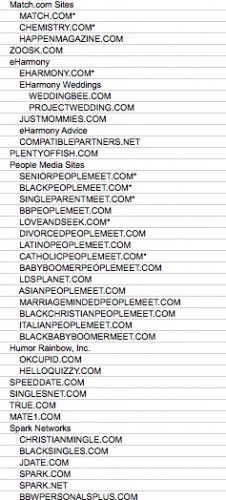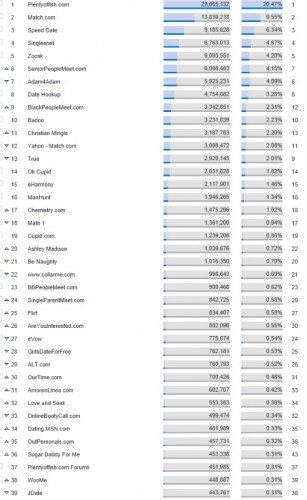Markus at Plentyoffish asks whatever happened to old-school dating sites like Perfectmatch, Date, Matchmaker and Christian Cafe? Two years ago they were all in the top 20 and now they don’t even make the top 50. Jdate is barely in the top 40 itself, and that is the absolute defintion of a niche dating site.
Ranking methodologies change (nobody can really get solid numbers across mobile, web and Facebook), the ever-evolving dating site industry is enjoying a new round of entrepreneurs stacking the deck with traffic tricks, traditional dating sites totally missed out on the Facebook viral marketing days, outliers like spam-tastic Badoo grab headlines but offer awful user experiences… the list goes on why the big dating sites continue to grow and the rest aren’t going anywhere fast, usually dropping off the map, with a few exceptions.
The industry is so fragmented with generic dating sites, its no wonder that Match keeps growing and growing. People don’t want 500 dating sites, they want a few big-box retailer site like Match and eHarmony and a well-defined network of niche sites (People Media). This is why Match is doing so well, but at some point there will be nobody worthwhile left for them to buy (scratches head over Singlesnet acquisition). Maybe Match will buy Cupid PLC, but they likely a bit to adult-oriented for Match’s tastes at this time.
Plenty of other sites making a million here and there, but those are rounding errors and usually such low-quality experiences that they will continue on forever solely based on cheap low-quality member acquisition costs. Enough people will stumble across them that they will manage to throw off enough cash to remain lucrative for the owners.
Given that there are around 15 new dating sites that have any sort of a chance of succeeding (money, market and team), this new wave of sites, especially the mobile ones, faces an uphill battle. We’ll all cheer them on, but the reality is that mobile dating is a fad. People will browse profiles on their phones, but as for picking someone up based on their location, I’m still waiting for any sort of report stating that a) people want this and b) it actually works. I know I’m poking the bear here, but there is so much hype about mobile dating and unless you are gay and on sites like Grindr, where’s the action?
I’d love to know how much email communication is originating on mobile apps, as opposed to responding and searching.
The strongest mobile sites will partner with brands that can push cheaper traffic. And then people will say that mobile dating never really worked out as expected and we’ll move onto something else like actual reputation and matching systems, which is what the industry really needs but these problems appear too difficult for entrepreneurs to attack. Why attempt difficult matching systems and invent reputation features when you can throw together a mobile app in a few weeks and pray for financing to actually get anyone to use the damn thing?
Here I am talking about mobile, but the real story is that most of the top dating sites of yesteryear are slipping off the radar. Thats what you get when you don’t innovate and evolve. They had their time in the limelight, but they got complacent, or unfocused, and their traffic and brand awareness suffered.
Now everyone is rushing out sub-par niche sites based on their old creaky platforms, which makes me cringe, because these companies know absolutely nothing about the niche’s they are going after. There is one niche left worth going after, can you guess what it is?
Here’s a recent rip of dating site rankings, followed by ranking from two years ago.



